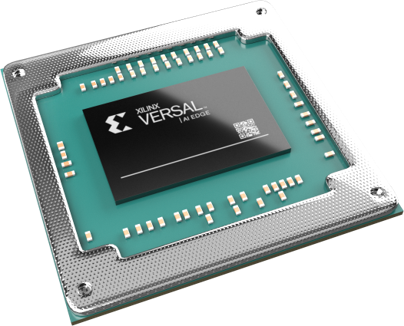Xilinx has introduced the Versal™ AI Edge series, designed to enable AI innovation from the edge to the endpoint. With 4X the AI performance-per-watt versus GPUs and 10X greater compute density versus previous-generation adaptive SoCs, the Versal AI Edge series is the world’s most scalable and adaptable portfolio for next-generation distributed intelligent systems.
Versal AI Edge adaptive compute acceleration platforms (ACAPs) deliver intelligence to a wide range of applications including: automated driving with the highest levels of functional safety, collaborative robotics, predictive factory and healthcare systems, and multi-mission payloads for the aerospace and defense markets. The portfolio features AI Engine-ML to deliver 4X machine learning compute compared to the previous AI Engine architecture and integrates new accelerator RAM with an enhanced memory hierarchy for evolving AI algorithms. These architectural innovations deliver up to 4X AI performance-per-watt versus GPUs and lower latency resulting in far more capable devices at the edge.
AI-enabled automated systems require high compute density that can accelerate whole applications from sensor to AI to real-time control. Versal AI Edge devices achieve this by delivering 10X compute density versus Zynq® UltraScale+™ MPSoCs, enabling more intelligent autonomous systems. Additionally, Versal AI Edge devices support multiple safety standards across industrial (IEC 61508), avionics (DO-254/178), and automotive (ISO 26262) markets, where vendors can meet ASIL C random hardware integrity and ASIL D systematic integrity levels.
"Edge computing applications require an architecture that can evolve to address new requirements and scenarios with a blend of flexible compute processing within tight thermal and latency constraints,” said Sumit Shah, senior director, Product Management and Marketing at Xilinx. “The Versal AI Edge series delivers these key attributes for a wide range of applications requiring greater intelligence, making it a critical addition to the Versal portfolio with devices that scale from intelligent edge sensors to CPU accelerators.”
“The market opportunity at the edge is growing exponentially and AI chipsets that serve these unique applications are expected to more than double from 2021 to 2025,” said Dan Mandell, senior analyst, IoT and Embedded Technology at VDC Research. “By creating a design for AI-specific tasks that focuses on performance acceleration while remaining scalable and with low power, Xilinx’s Versal AI Edge series is a compelling solution to address these critical markets.”
The Versal AI Edge series takes the production-proven 7nm Versal architecture and miniaturizes it for AI compute at low latency, all with power efficiency as low as six watts and safety and security measures required in edge applications. As a heterogeneous platform with diverse processors, the Versal AI Edge series matches the engine to the algorithm, with Scalar Engines for embedded compute, Adaptable Engines for sensor fusion and hardware adaptability, and Intelligent Engines for AI inference that scales up to 479 (INT4) TOPS[2]—unmatched by ASSPs and GPUs targeting edge applications—and for advanced signal processing workloads for vision, radar, LiDAR, and software defined radio.
Connectivity blocks range from LPDDR-4266, 32Gb/s transceivers to meet all the necessary protocols in edge applications, 40G multirate Ethernet, PCIe® Gen4 with CCIX, and native MIPI support for vision sensors up to eight-megapixel resolution and beyond—critical to Level-2 ADAS and above. With more powerful AI Engines and an enhanced memory hierarchy that includes accelerator RAM, the Versal AI Edge series is ideal for a wider range of applications across numerous markets.
Accessible to both hardware and software developers, Versal AI Edge ACAPs provide a design-entry point for any developer, including Vivado® design tools for hardware developers, the Vitis™ unified software platform for software developers, Vitis AI for data scientists, and domain-specific operating systems, frameworks, and acceleration libraries for the platform’s target applications.
The Versal AI Edge series is the newest member of the Versal ACAP portfolio, adaptive SoCs that are fully software-programmable, with performance and flexibility that far exceed that of conventional CPUs, GPUs, and FPGAs. ACAPs can be changed at both the hardware and software level to dynamically adapt to the needs of a wide range of applications and workloads from edge to cloud. Versal AI Core and Versal Prime series are in full production, with Versal Premium ACAPs now sampling.




